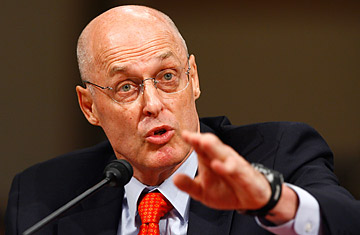
U.S. Treasury Secretary Henry Paulson testifies before the Senate Banking, Housing and Urban Affairs Committee on Capitol Hill September 23, 2008 in Washington, DC.
Henry Paulson is a very confident guy. Sitting in his office Wednesday morning before heading up for a second day of grilling in front of skeptical members of Congress, the Treasury Secretary seemed certain he'd get the massive new powers and huge sums of money he's asking for, despite the feverish horsetrading and recriminations still unfolding on the Hill. "I believe we're going to get a bill that works and a clean bill," he told TIME. "It certainly won't be exactly what we asked for, it never is, but it's got to be sufficient to let us do the job." And Paulson thinks he'll get it soon. "We're right in the period where the sausage is being made," he says, but "I clearly believe we're going to get it done this week. We need to get it done this week."
Paulson has reason to strut, and it's not just because he pushes around foreign governments and big bankers in his spare time, or that he has pictures of himself handling snakes decorating his office. The key reason he thinks he'll win this encounter with Congress is that this is one deal that really must get done. Last Thursday the great American credit panic of 2008 was on the verge of halting the country's financial circulatory system. Anyone with money to lend was hoarding it and big institutions were starting a run on the money market funds that hold the hard-earned savings of millions of Americans and support $1.7 trillion in short-term borrowings U.S. businesses rely on to meet payrolls and stay afloat.
Only two things stopped the panic. One was Paulson's move to guarantee the money market funds with a special hoard of Treasury money usually reserved for stabilizing the dollar against other currencies. The other was the announcement Thursday night of the plan to lift the bad loans (and the myriad complex assets made up of them) out of the system and put them, at least temporarily, on the taxpayers' balance sheet. If the deal falls through, the panic will almost surely begin again.
Paulson knows it. And that's why he's ready to play tough, like hinting that things are still dangerous and Congress, which has been informally debating add-on provisions like equity stakes in the Wall Street firms and new limits on executive compensation, doesn't have all the time in the world to act. "These markets are still very fragile and the conditions in the credit markets are very tight," he says. Asked whether ongoing negotiations on the Hill could spook markets, he says, "That obviously impacts the market and the markets are watching what's going on."
The biggest problem Paulson faces, though, is that the American people don't seem to have understood that the crisis on Wall Street could spread to Main Street with very painful consequences. "We just haven't communicated as well as we need to," Paulson acknowelged this morning. "The average American looks at this as being about Wall Street, and they're angry, and I'm angry too. There have been huge excesses and flaws in the system, but the average American doesn't understand the implications this has for them: money needs to flow through the system so that every American business virtually every day can operate the way it needs to."
Paulson faces other problems on Capitol Hill too. Both parties in Congress are by now deeply skeptical of any new Administration demands for increased executive authority and are vehemently pushing for more oversight of how Treasury will manage the bailout. The Paulson plan is bigger in that regard than just about anything Bush asked for in the war on terror. Section eight of the proposal he sent to Congress says, for example, "Decisions by the Secretary pursuant to the authority of this Act are non-reviewable and committed to agency discretion, and may not be reviewed by any court of law or any administrative agency."
Senators and Representatives feel most keenly uncomfortable about the nasty politics of the deal. In an election year dominated by a bad economy, it's not good to throw huge money at a bunch of Wall Street firms, especially when each party is worried the other is going to bluff and ultimately try to use the deal as a populist rallying cry. This is compounded by the fact that Paulson just happened to lead one of the biggest market players, Goldman Sachs, before coming to Treasury. In that role, he acknowledges, he placed a lot of the bad debt that the now defunct Fannie Mae and Freddie Mac were peddling. "Yeah, I and everyone else placed Fannie and Freddie debt," he says, but "We didn't create this system and this was a mess that had to be cleaned up." He also acknowledges that he put the former Fannie Mae head, Jim Johnson, on the board of Goldman, and that Johnson chaired Paulson's compensation committee.
All of this, however, will not be enough to blow out the deal, because the consequences of a collapse in the so-called shadow banking system would be much worse. Over the last 20 years Wall Street built what amounted to a parallel finance system that was specifically designed to avoid the banking safeguards implemented after the crash of 1929, which limited how much an institution could be leveraged in exchange for stability. The shadow system grew nearly to the size of the real banking system, and its demise now threatens both. "As much as I don't want to be here asking for this, it pains me to do this, we believe that this is much less costly than the alternative," Paulson said this morning. "The taxpayer is already on the hook for the impact on the economy if our financial markets don't work the way they need to work," he said.
